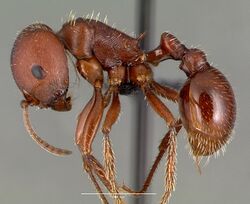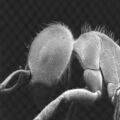Biology:Pogonomyrmex
| Pogonomyrmex | |
|---|---|

| |
| Pogonomyrmex barbatus worker | |
| Scientific classification | |
| Kingdom: | Animalia |
| Phylum: | Arthropoda |
| Class: | Insecta |
| Order: | Hymenoptera |
| Family: | Formicidae |
| Subfamily: | Myrmicinae |
| Tribe: | Pogonomyrmecini |
| Genus: | Pogonomyrmex Mayr, 1868 |
| Type species | |
| Formica badia Latreille, 1802
| |
| Diversity[1] | |
| 69 species | |
| Synonyms | |
|
Ephebomyrmex Wheeler, 1902 | |
Pogonomyrmex is a genus of harvester ants, occurring primarily in the deserts of North, Central, and South America, with a single endemic species from Haiti.[2]
Description
The genus name originated from the Greek language and refers to a beard-like structure, the psammophore, below the head (Greek πώγων/pōgōn, "beard" + μύρμηξ/murmēx, "ant"), which can be found in most species of the subgenus sensu stricto. The psammophore is used for gathering small seeds, helping to increase the efficiency of transportation of fine sand and pebbles during nest construction, or to carry eggs. However, this structure is missing in species of the subgenus Ephebomyrmex (Greek ἔφηβος/ephēbos, "beardless lad"), and these species generally have smaller individuals and colonies.[citation needed]
Venom
Pogonomyrmex (sensu stricto) workers have the most toxic venom documented in any insects, with Pogonomyrmex maricopa being the most toxic tested thus far.Cite error: Closing </ref> missing for <ref> tag
- Pogonomyrmex huachucanus Wheeler, 1914
- Pogonomyrmex humerotumidus Vásquez-Bolaños & Mackay, 2004
- Pogonomyrmex imberbiculus Wheeler, 1902
- Pogonomyrmex inermis Forel, 1914
- Pogonomyrmex kusnezovi Cuezzo & Claver, 2009[3]
- Pogonomyrmex laevigatus Santschi, 1921
- Pogonomyrmex laevinodis Snelling, 1982
- Pogonomyrmex laticeps Santschi, 1922
- Pogonomyrmex lobatus Santschi, 1921
- Pogonomyrmex longibarbis Gallardo, 1931
- Pogonomyrmex magnacanthus Cole, 1968
- Pogonomyrmex marcusi Kusnezov, 1951
- Pogonomyrmex maricopa Wheeler, 1914
- Pogonomyrmex mayri Forel, 1899
- Pogonomyrmex mendozanus Cuezzo & Claver, 2009[3]
- Pogonomyrmex meridionalis Kusnezov, 1951
- Pogonomyrmex micans Forel, 1914
- Pogonomyrmex mohavensis Johnson & Overson, 2009[4]
- Pogonomyrmex montanus MacKay, 1980
- Pogonomyrmex naegelii Emery, 1878
- Pogonomyrmex occidentalis (Cresson, 1865)
- Pogonomyrmex odoratus Kusnezov, 1949
- Pogonomyrmex pima Wheeler, 1909
- Pogonomyrmex pronotalis Santschi, 1922
- Pogonomyrmex rastratus Mayr, 1868
- Pogonomyrmex rugosus Emery, 1895
- Pogonomyrmex salinus Olsen, 1934
- Pogonomyrmex saucius Wheeler & Mann, 1914
- Pogonomyrmex schmitti Forel, 1901
- Pogonomyrmex snellingi Taber, 1998
- Pogonomyrmex stefani Lattke, 2006[5]
- Pogonomyrmex striatinodus Fernández & Palacio, 1998
- Pogonomyrmex subdentatus Mayr, 1870
- Pogonomyrmex subnitidus Emery, 1895
- Pogonomyrmex sylvestris Lattke, 1991
- Pogonomyrmex tenuipubens Santschi, 1936
- Pogonomyrmex tenuispinus Forel, 1914
- Pogonomyrmex texanus Francke & Merickel, 1982
- Pogonomyrmex theresiae Forel, 1899
- Pogonomyrmex uruguayensis Mayr, 1887
- Pogonomyrmex variabilis Santschi, 1916
- Pogonomyrmex vermiculatus Emery, 1906
- Pogonomyrmex wheeleri Olsen, 1934
Gallery
-
P. californicus
-
P. barbatus with psammophore visible
-
Pogonomyrmex collecting food item
-
Larvae of P. barbatus
References
- ↑ Bolton, B. (2014). "Pogonomyrmex". AntCat. http://antcat.org/catalog/429784.
- ↑ Cole, A.C. 1968. Pogonomyrmex Harvester Ants: a study of the genus in North America. University of Tennessee Press, Knoxville, TN.
- ↑ 3.0 3.1 Cuezzo, F. and S. Claver. (2009). Two new species of the ant genus Pogonomyrmex (Hymenoptera: Formicidae) from Argentina. Rev. Soc. Entomol. Argent 68(1-2), 97-106.
- ↑ Johnson, R. A. and R. P. Overson. (2009). A new North american species of Pogonomyrmex (Hymenoptera: Formicidae) from the Mohave Desert of eastern California and western Nevada. Journal of Hymenptera Research 18(2), 305-14.
- ↑ Lattke, J. E. (2006). A new species of Pogonomyrmex (Hymenoptera: Formicidae) from gallery forests of the Orinoco Watershed, Venezuela.[yes|permanent dead link|dead link}}] Myrmecologische Nachrichten 8, 53-57.
External links
Wikidata ☰ Q138710 entry
 |




